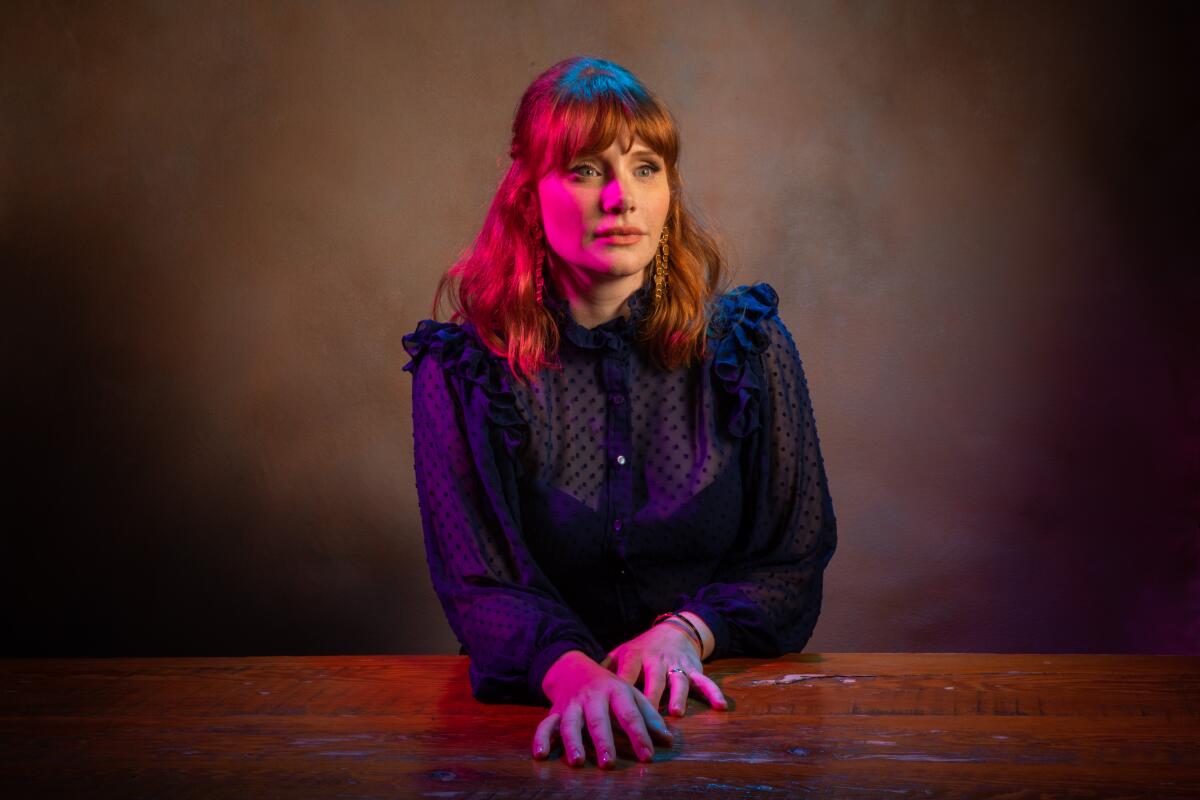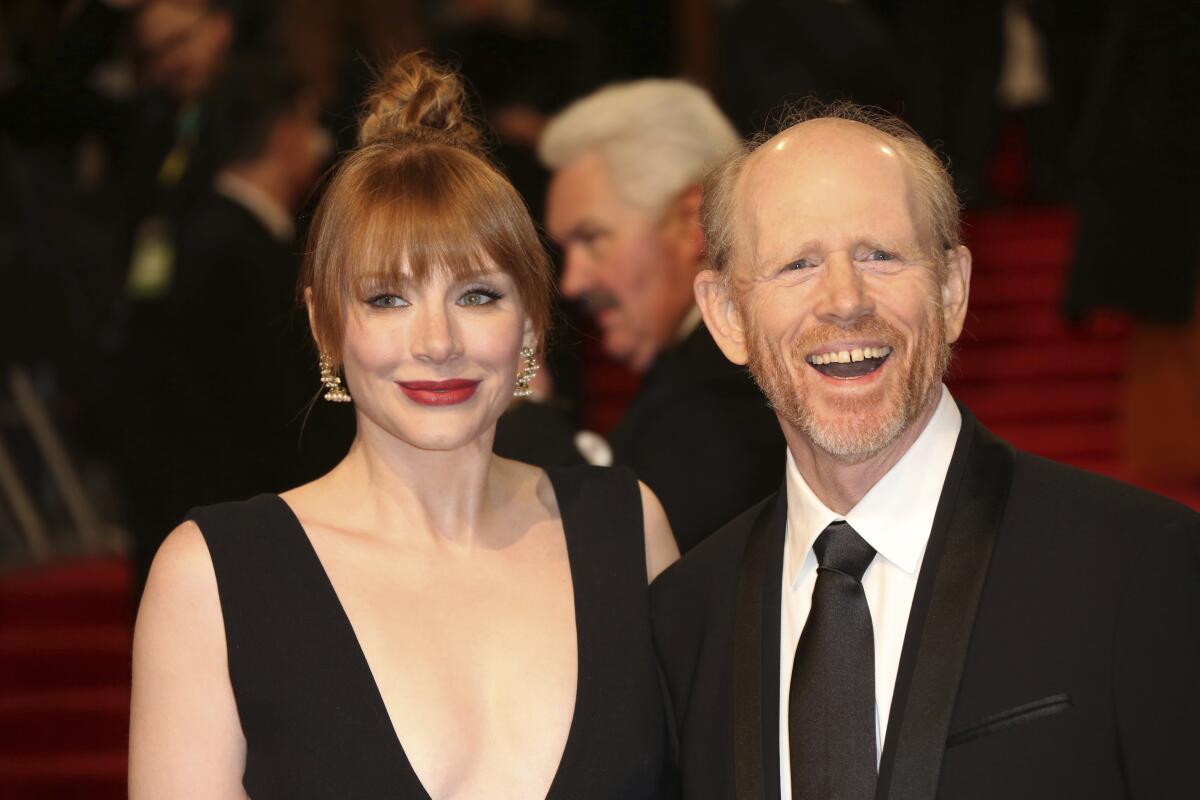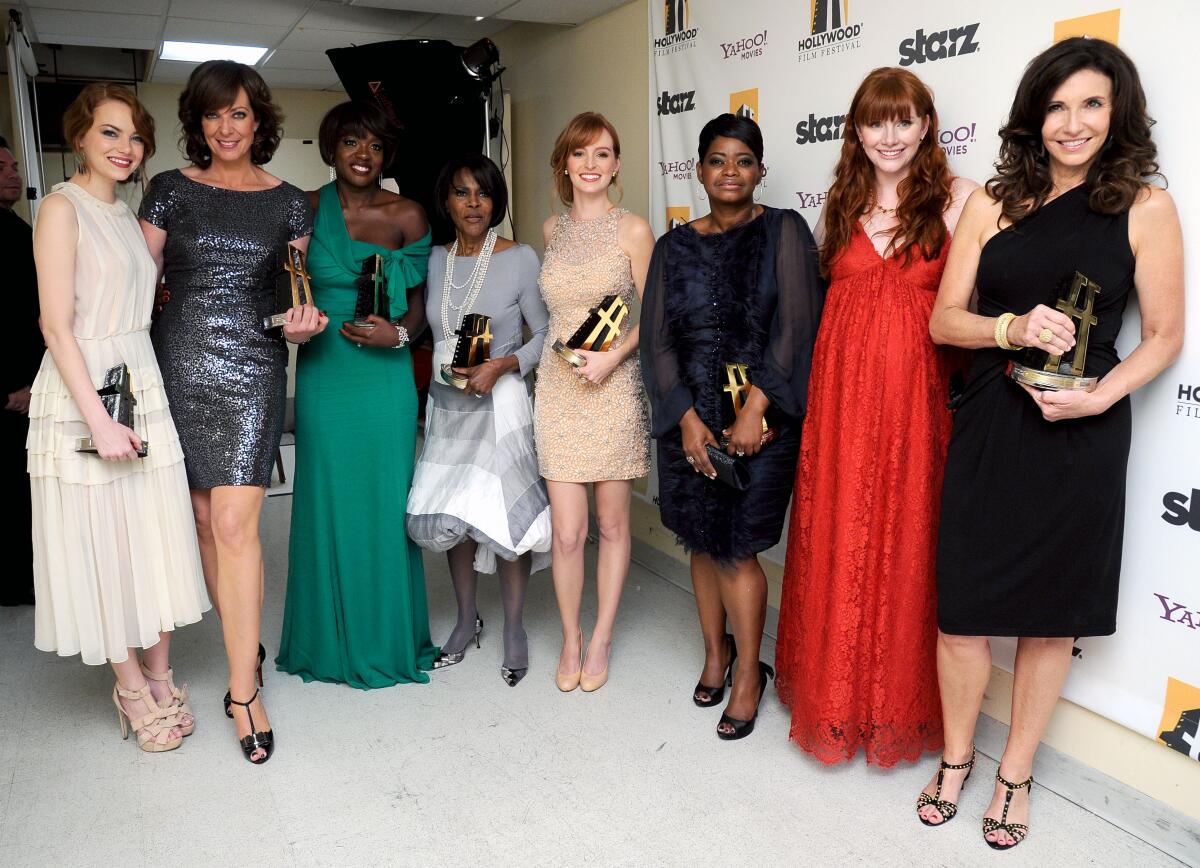Why Bryce Dallas Howard wouldn’t make ‘The Help’ today

- Share via
Amid the coronavirus outbreak, the public has been given a rare glimpse inside the homes of news anchors, politicians and “Saturday Night Live” comedians. So knowing that her Zoom appearance had the potential to be judged by the likes of Room Rater — a Twitter account that judges the home backdrops of television interviews — Bryce Dallas Howard was prepared. Before a round of virtual interviews to promote her feature directorial debut, a documentary about modern fatherhood called “Dads,” she had distributor Apple TV+ send her a fabric photography backdrop. Her Oscar-winning makeup artist, Vivian Baker, mailed her a professional lighting kit and then taught her how to apply faux eyelashes via FaceTime.
But after “Dads” drops on the streaming platform this weekend, the actress will no longer be confined to her home in upstate New York. Within days, she is planning to fly to the United Kingdom to quarantine for two weeks and then resume filming on Universal Pictures’ sequel “Jurassic World: Dominion.” After abruptly shutting down production in March, the film will become one of the first major Hollywood studio projects to attempt filming during the COVID-19 pandemic. Howard, 39, will reluctantly leave behind her husband, son (13) and daughter (8) to commence work on the franchise.
The Times spoke with Howard about her comfort level in returning to production, why making “Dads” was a perfect Father’s Day gift, and how she feels about both the hit race drama “The Help” and that controversial celebrity antiracism PSA produced by the NAACP.
Universal is reportedly preparing the U.K. set of “Jurassic World” with measures like extensive testing, on-site doctors and 150 hand sanitizer stations. Is it enough to make you feel safe returning to work?
That’s not even the half of it. It’s really extensive, and I feel so relieved. It’s really, really, really thought-out, which is a big deal. To me, it’s just about hearing the science and hearing from doctors, as opposed to it being about my own comfort level. And even though we’re going and we’re doing this, we are taking it a day at a time. So if at some point something changes or there’s new information, they’re going to protect us before they’re protecting their investment. And that’s the right attitude.
So if you had felt uncomfortable returning to the set right now, you could have refused?
I would be able to. I wouldn’t be bullied into it or anything like that. But I’m committed to getting there. From the beginning I was like, “OK, listen, everything is figure-outable.”
Did you want to bring your family?
There wasn’t a definitive “you can’t bring your kids.” I was going to bring my family, but I do not think I’m going to bring my family, at least for the first part. That’s the biggest deal for me. But I’m not the only one going through it.
“Dads” was financed by Dove Men+Care, which is owned by Unilever. Were you concerned that because of this, the movie might look like an advertisement for the company?
It was really clear that it wasn’t a commercial for them. It wasn’t advertising products — it wasn’t even advertising their name. They wanted to invest in supporting modern fathers around the world. And the way they did it was by creating these paternity leaves, transforming their company internally and financing a feature film about modern dads. For sure, there was a point where — I’ve always said to myself: Female leads. Nonnegotiable. So my first movie [as a director] is “Dads”? It has all men in it?
How did you reconcile that?
I’ve thought about it, and the only reason why this movie feels even remotely fresh is because it’s about parenting from the perspective of the father. We’ve seen a lot of parenting from the perspective of the mother. I have so many examples to look to as a mother — on movies, television, the Olympics — you see the heroic mom. I’m like, “I better be an amazing mom. There are so many examples out there.” And oftentimes for men, the only example they have is their father or grandfather. It’s empowering men to get in there and empowering women to allow for that to happen.
How are you celebrating Father’s Day this year?
My daughter asked me on Mother’s Day: “Mommy, what are you going to get for daddy for Father’s Day?” I was like, “Oh, I directed a documentary this year.” But I think in truth, we’re going to hang out here and the whole sort of breakfast-in bed deal. And then we’ll probably head over to my parents’, who are less than a half-hour away. There’s the age-old question: Do you want to spend Mother or Father’s Day with or without your children? It’s going to be with, for sure. Eight and 13 is fun. It’s like we have roommates who can clean their own toilets.

Your dad, the director Ron Howard, is in “Dads.” Because of his reputation as a filmmaker, were you at all leery about him appearing in your first feature-length movie?
I was insecure about that when I was younger. When I went to NYU, I wouldn’t tell anyone my last name and I was like, “No, Dad, you can’t come see my play because people might recognize you.” But I realized pretty quickly that my parents were exceptional people and stand-up parents. For me to be weird about something that honestly, really doesn’t have anything to do with me — I just realized, that’s just shortsighted. So many of my peers at NYU had parents who were really not supportive of them being artists in any way, shape or form, which totally made sense because they were scared for them. I had parents who were emotionally supportive of me. ... There wasn’t a lot of baggage that I inherited from them in that way. Have you met my dad? He’s sweet, isn’t he?
He is. Did you learn a lot from him, growing up on his sets?
I went to set with my dad every single day when I was a child. When I would get grounded, when I was in trouble, I wouldn’t be allowed to go to set. So I was extremely well-behaved. They gave me jobs, starting when I was 7. I was in charge of squeezing the orange juice at craft service. At 11, I started getting work in the production office making Xerox copies and running things places. And at 12 or 13, I got to be a baby PA and had my own walkie-talkie and getting people’s lunch orders and setting up for dailies. ... Getting to be privy to that process and seeing how much failure and rejection is baked into that — when I started working as an actor, I realized that many of my peers didn’t have that experience and were really tough on themselves when they didn’t get a part or messed up on the day.
You recently posted on Instagram about the fact that “The Help” was No. 1 on Netflix, saying you’d made great friends on set but encouraging your fans to watch Black stories made by Black creators instead. What prompted you to post that?
Being around movie sets, I know what goes into a production. So when I’m watching a movie, I know when I see the director’s name that they were really, really involved and it’s largely their opinions and the writer’s opinion. The actors, I don’t want to say we’re props — we can be more than props. [Laughs] But the final decision is not ours. I know who has the power. And so right now, in this time, stories are going to play a crucial role in our ability to empathize and to be inspired into action. And the storytellers who we must listen to right now and look to and learn from — there’s an extraordinary body of work that centers on Black characters from Black creators.

Would you still make “The Help” today?
No. But what I will say is: What I’ve seen is that folks have the courage to say that. “With all due respect, I love this project, I do not think you could be the filmmaker.” That’s a really powerful thing to say. That’s an important stance to take in order to make room for the true authentic storytellers. ... In this transformation that’s happening, there’s a new freedom of expression. I’m seeing from others — and feeling from myself — that it is less about worrying about offending people and looking within and saying, “Why? What really am I scared of, and what is that reinforcing?” And so I posted it and didn’t look back.
And yet another thing you were a part of — a PSA created by the NAACP featuring white celebrities taking responsibility for their racism — was lambasted on social media. Do you feel like stars can’t get it right when it comes to speaking out about social change?
It’s so not about getting it right. It’s about your own work and your own involvement. You know whether or not you’re showing up. For myself, I want to be an active ally. And if the NAACP comes to me and says “Will you do this?” I say, “Yes.” No questions. And that’s OK. I feel good about that. I don’t think it was clear that it was from the NAACP. It was a lot of white people. And so I understand the perception of it. But it also is not a mistake. The fear of saying something wrong, while that’s completely understandable — how do you not be afraid of that? Learning. Talking about racism has been so taboo, particularly within the white community. And it’s our issue. So we must talk about it and make ourselves uncomfortable.
More to Read
The biggest entertainment stories
Get our big stories about Hollywood, film, television, music, arts, culture and more right in your inbox as soon as they publish.
You may occasionally receive promotional content from the Los Angeles Times.











